At the Phoenix Trump rally, the guy in the red circle below has a shirt on which advertises websites called Gods2.com and blacksfortrump2020.com. When clicked, the websites go to honestfact.com. The website targets Cherokees as the KKK, and blames Mormons and Slavs for many things, although it is hard to follow the whole thing. It is mostly an incoherent mess.
Trump said hate has no place in America. But apparently, it has a place at his rally.
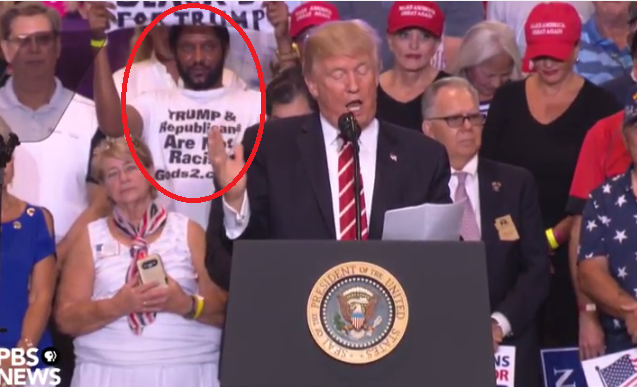
So I went to the website and it is a pretty strange space. Here is the first message there:
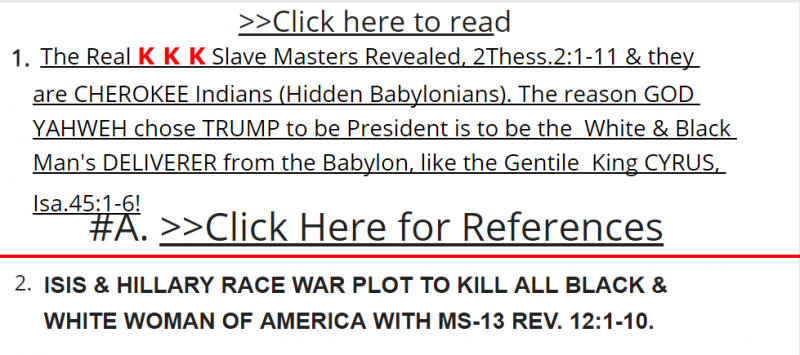
Cherokees? The real KKK is made up of Native American Cherokees? So says the man within a few feet from the president.
Also, Mormons are apparently blocking something:
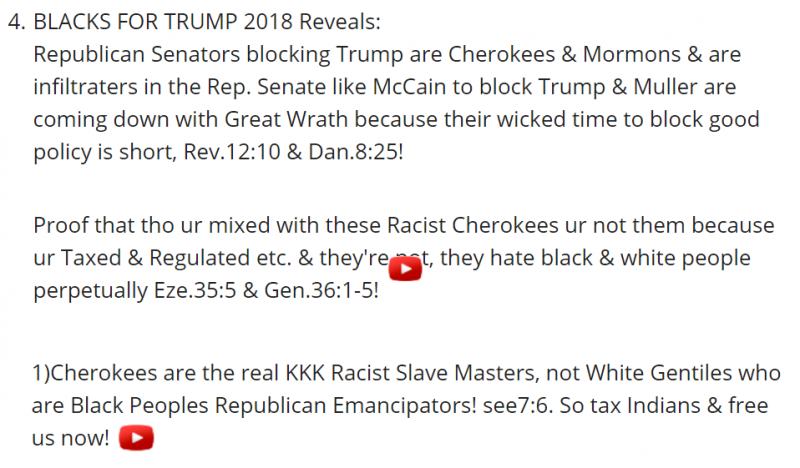
Apparently Trump doesn’t screen his stage supporters very well.
Even though I am watching the speech, I can’t believe I am listening to the president of the United States.
Apparently, this guy has quite a past and shows up at all Trump rallies (source).
Month: August 2017
The 1787 Constitutional Convention – Southern States Stand on Slavery
August 22, 1787 (Click to read Madison’s notes)
Summary
The delegates debated slavery’s place in the new nation and prohibited bills of attainder and ex post facto laws. The delegates referred the slavery question to a committee.
Influences on the Delegates
The delegates began the slavery debate the day before today’s session. In essence, they were debating these sections of Article VII:
Sect. 3. The proportions of direct taxation shall be regulated by the whole number of white and other free citizens and inhabitants of every age, sex and condition, including those bound to servitude for a term of years, and three-fifths of all other persons not comprehended in the foregoing description, (except Indians not paying taxes); which number shall, within six years after the first meeting of the Legislature, and within the term of every ten years afterwards, be taken in such a manner as the said Legislature shall direct.
Sect. 4. No tax or duty shall be laid by the Legislature on articles exported from any State; nor on the migration or importation of such persons as the several States shall think proper to admit; nor shall such migration or importation be prohibited.
I wrote yesterday that the debate left me with little doubt that many of the delegates did not attempt to incorporate Christianity into their thinking. They didn’t appeal to religion and in fact South Carolina’s Rutledge denied that religion or humanity had anything to do with the matter.
In today’s discussion, Christian delegate Roger Sherman sounded the voice of compromise.
Mr. SHERMAN was for leaving the clause as it stands. He disapproved of the slave-trade; yet as the States were now possessed of the right to import slaves, as the public good did not require it to be taken from them, and as it was expedient to have as few objections as possible to the proposed scheme of government, he thought it best to leave the matter as we find it. He observed that the abolition of slavery seemed to be going on in the United States, and that the good sense of the several States would probably by degrees complete it. He urged on the Convention the necessity of despatching its business.
In what has become a famous speech, George Mason ranted about how evil slavery was and attempted to integrate Christian ideas. However, as a slave holder, his rant rang a little hollow.
Colonel MASON. This infernal traffic originated in the avarice of British merchants. The British Government constantly checked the attempts of Virginia to put a stop to it. The present question concerns not the importing States alone, but the whole Union. The evil of having slaves was experienced during the late war. Had slaves been treated as they might have been by the enemy, they would have proved dangerous instruments in their hands. But their folly dealt by the slaves as it did by the tories. He mentioned the dangerous insurrections of the slaves in Greece and Sicily; and the instructions given by Cromwell to the commissioners sent to Virginia, to arm the servants and slaves, in case other means of obtaining its submission should fail. Maryland and Virginia, he said, had already prohibited the importation of slaves expressly. North Carolina had done the same in substance. All this would be in vain, if South Carolina and Georgia be at liberty to import. The Western people are already calling out for slaves for their new lands; and will fill that country with slaves, if they can be got through South Carolina and Georgia. Slavery discourages arts and manufactures. The poor despise labor when performed by slaves. They prevent the emigration of whites, who really enrich and strengthen a country. They produce the most pernicious effect on manners. Every master of slaves is born a petty tyrant. They bring the judgment of Heaven on a country. As nations cannot be rewarded or punished in the next world, they must be in this. By an inevitable chain of causes and effects, Providence punishes national sins by national calamities. He lamented that some of our Eastern brethren had, from a lust of gain, embarked in this nefarious traffic. As to the States being in possession of the right to import, this was the case with many other rights, now to be properly given up. He held it essential in every point of view, that the General Government should have power to prevent the increase of slavery.
While we can commend Mason for his negative comments about slavery, we can’t say as David Barton did recently, that American slavery was a human issue and not a race issue to the founders. At least in the case of Mason, he clearly preferred whites over blacks coming into the country.
Connecticut’s Ellsworth called out Mason (by implication) as a slave holder.
Mr. ELLSWORTH, as he had never owned a slave, could not judge of the effects of slavery on character. He said, however, that if it was to be considered in a moral light, we ought to go further and free those already in the country. As slaves also multiply so fast in Virginia and Maryland that it is cheaper to raise than import them, whilst in the sickly rice swamps foreign supplies are necessary, if we go no further than is urged, we shall be unjust towards South Carolina and Georgia. Let us not intermeddle. As population increases, poor laborers will be so plenty as to render slaves useless. Slavery in time, will not be a speck in our country. Provision is already made in Connecticut for abolishing it. And the abolition has already taken place in Massachusetts. As to the danger of insurrections from foreign influence, that will become a motive to kind treatment of the slaves.
Sadly, Mason was more right than Ellsworth on the eventual result of slavery. We did suffer a national calamity because slaves were not considered useless by Southern states leaders.
Next, the delegates Pinckney justified slavery and invoked fairness as a value. It wouldn’t be fair to Georgia or South Carolina if slavery were curtailed.
Mr. PINCKNEY. If slavery be wrong, it is justified by the example of all the world. He cited the case of Greece, Rome, and other ancient states; the sanction given by France, England, Holland, and other modern states. In all ages one half of mankind have been slaves. If the Southern States were let alone, they will probably of themselves stop importations. He would himself, as a citizen of South Carolina, vote for it. An attempt to take away the right, as proposed, will produce serious objections to the Constitution, which he wished to see adopted.
General PINCKNEY declared it to be his firm opinion, that if himself and all his colleagues were to sign the Constitution, and use their personal influence, it would be of no avail towards obtaining the assent of their constituents. South Carolina and Georgia cannot do without slaves. As to Virginia, she will gain by stopping the importations. Her slaves will rise in value, and she has more than she wants. It would be unequal, to require South Carolina and Georgia to confederate on such unequal terms. He said the Royal assent, before the Revolution, had never been refused to South Carolina, as to Virginia. He contended, that the importation of slaves would be for the interest of the whole Union. The more slaves, the more produce to employ the carrying trade; the more consumption also; and the more of this, the more revenue for the common treasury. He admitted it to be reasonable that slaves should be dutied like other imports; but should consider a rejection of the clause as an exclusion of South Carolina from the Union.
Did the delegates respond to Mason’s warnings about God’s disapproval? Not at all, the arguments here were not religious or even designed to counter religious arguments. If theology had been argued here, one might suggest that the delegates wanted a Christian republic but disagreed about doctrine or points of theology. The only reference again to religious arguments was Randolph’s fear that the Quakers and Methodists would oppose the Constitution over slavery.
Mr. RANDOLPH was for committing, in order that some middle ground might, if possible, be found. He could never agree to the clause as it stands. He would sooner risk the Constitution. He dwelt on the dilemma to which the Convention was exposed. By agreeing to the clause, it would revolt the Quakers, the Methodists, and many others in the States having no slaves. On the other hand, two States might be lost to the Union. Let us then, he said, try the chance of a commitment.
In the end, the delegates committed the question to a committee.
On the question for committing the remaining part of Sections 4 and 5 of Article 7, — Connecticut, New Jersey, Maryland, Virginia, North Carolina, South Carolina, Georgia, aye, — 7; New Hampshire, Pennsylvania, Delaware, no, — 3; Massachusetts, absent.
1787 Constitutional Convention Series
To read my series examining the proceedings of the Constitution Convention, click here. In this series, I am writing about any obvious influences on the development of the Constitution which were mentioned by the delegates to the Convention. Specifically, I am testing David Barton’s claim that “every clause” of the Constitution is based on biblical principles. Thus far, I have found nothing supporting the claim. However, stay tuned, the series will run until mid-September.
Constitutional Convention Series (click the link)
To follow on social media, click the following links:
Facebook (blog posts and news)
Facebook (Getting Jefferson Right – history news)
Twitter
The 1787 Constitutional Convention – Religion Unrelated to Slavery
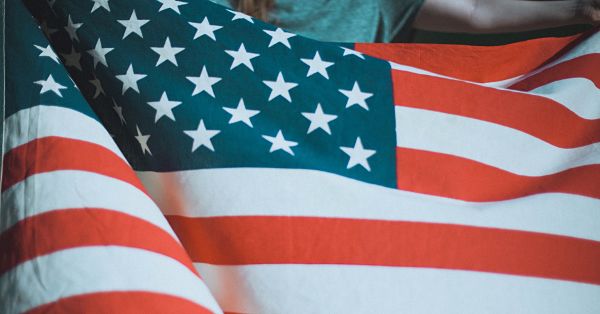
August 21, 1787 (Click to read Madison’s notes on the day)
Summary
The delegates discussed taxation and slavery. The topics were related because direct taxation was tied to the population of whites and 2/3 of “other persons.” The delegates also discussed the slave trade with no resolution during this session.
Influences on the Delegates
Britain was again an example, this time a negative one:
Mr. GERRY was strenuously opposed to the power over exports. It might be made use of to compel the States to comply with the will of the General Government, and to grant it any new powers which might be demanded. We have given it more power already than we know how will be exercised. It will enable the General Government to oppress the States, as much as Ireland is oppressed by Great Britain.
Mr. FITZSIMONS would be against a tax on exports to be laid immediately; but was for giving a power of laying the tax when a proper time may call for it. This would certainly be the case when America should become a manufacturing country. He illustrated his argument by the duties in Great Britain on wool, &c.
Slavery opponents again tried to limit the slave trade. South Carolina’s Pinckney said there would be no approval from SC if the slave trade was limited.
Mr. L. MARTIN proposed to vary Article 7, Section 4, so as to allow a prohibition or tax on the importation of slaves. In the first place, as five slaves are to be counted as three freemen, in the apportionment of Representatives, such a clause would leave an encouragement to this traffic. In the second place, slaves weakened one part of the Union, which the other parts were bound to protect; the privilege of importing them was therefore unreasonable. And in the third place, it was inconsistent with the principles of the Revolution, and dishonorable to the American character, to have such a feature in the Constitution.
Mr. RUTLEDGE did not see how the importation of slaves could be encouraged by this section. He was not apprehensive of insurrections, and would readily exempt the other States from the obligation to protect the Southern against them. Religion and humanity had nothing to do with this question. Interest alone is the governing principle with nations. The true question at present is, whether the Southern States shall or shall not be parties to the Union. If the Northern States consult their interest, they will not oppose the increase of slaves, which will increase the commodities of which they will become the carriers.
Mr. ELLSWORTH was for leaving the clause as it stands. Let every State import what it pleases. The morality or wisdom of slavery are considerations belonging to the States themselves. What enriches a part enriches the whole, and the States are the best judges of their particular interest. The old Confederation had not meddled with this point; and he did not see any greater necessity for bringing it within the policy of the new one.
Mr. PINCKNEY. South Carolina can never receive the plan if it prohibits the slave-trade. In every proposed extension of the powers of Congress, that State has expressly and watchfully excepted that of meddling with the importation of negroes. If the States be all left at liberty on this subject, South Carolina may perhaps, by degrees do of herself what is wished, as Virginia and Maryland already have done.
This is a remarkable account of the discussion on slavery. Luther Martin who was a slave holder believed the slave trade was “dishonorable to the American character” and should not be allowed by the Constitution. Then South Carolina’s Rutledge and Pinckney dropped the threat of withdrawal. They were joined by Ellsworth of Connecticut who said the states could decide what was moral.
This is a devastating passage for those who want us to believe that the delegates were crafting a Christian biblically based Constitution. Not only did these delegates deny the role of religion, they took a terrible stance regarding human bondage. Some of the delegates had qualms about it (Morris was quite articulate on the subject) but they were not willing to risk the union over the matter.
In this exchange, it seems very clear that the delegates were not using Christianity or the Bible as a guide. They didn’t look to revelation for the principles of government we now live by. While they held true to Republican principles because rationally they seemed to be fair and respectful of natural rights, they didn’t self-consciously appeal to Christianity for the content of those principles.
1787 Constitutional Convention Series
To read my series examining the proceedings of the Constitution Convention, click here. In this series, I am writing about any obvious influences on the development of the Constitution which were mentioned by the delegates to the Convention. Specifically, I am testing David Barton’s claim that “every clause” of the Constitution is based on biblical principles. Thus far, I have found nothing supporting the claim. However, stay tuned, the series will run until mid-September.
Constitutional Convention Series (click the link)
To follow on social media, click the following links:
Facebook (blog posts and news)
Facebook (Getting Jefferson Right – history news)
Twitter
Wheaton College Faculty Issue Condemnation of White Supremacy
I commend the Wheaton College faculty for this public statement condemning white supremacy. Over 140 faculty members signed it. You can read it here. In contrast, some alums of Liberty University have returned their diploma to the school in protest over president Jerry Falwell, Jr.’s support for Trump’s response to Charlottesville.
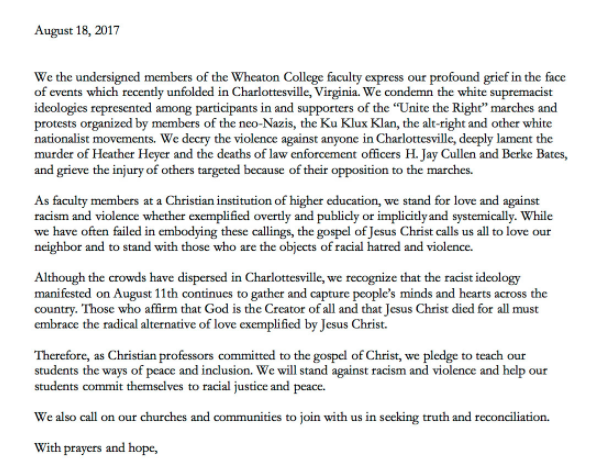
I agree with my professor brothers and sisters at Wheaton and add my support.
Hat tip to Jim West
David Barton Says Lee Wasn't a Racist and Likens Statues of Stalin to Confederate Statues
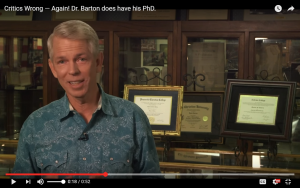
On the Joe Pags Show last Friday, David Barton likened Confederate statues as historical icons to the Holocaust ovens and Gestapo headquarters in Germany. In response to my critique of this analogy, Barton gave extended remarks to Austin American-Statesman reporter Jonathan Tilove in an article published today. In his remarks, Barton said Confederate statues were celebratory at the time they were put up in the same way statues of Stalin were celebratory. He also said Confederate General Robert E. Lee was “not a racist in any way, shape, fashion or form.”
Before I critique Barton’s statements about Stalin and Lee, let me observe that Barton clearly declared the evils of slavery and the Confederacy in this interview. While I disagree with his analogies and reasoning, I don’t think Barton intends for his defense of Confederate statues to encourage white supremacist Confederate sympathizers. Having made that important observation, I will say that his reference to Stalin doesn’t work and his defense of Lee is in line with the Lost Cause sanitizing of Lee’s life.
Stalin and Confederate Symbols
Tilove asked Barton about his comparison of Nazi atrocities and Confederate symbols. Barton didn’t address that point but pivoted to a new analogy involving Stalin. From Tilove’s article:
TILOVE
I [Tilove] asked if there wasn’t a difference between the maintaining of Nazi sites in Europe as a grim reminder and the heroic glorification of Confederate memorials.
Aren’t the Confederate memorials celebratory?
BARTON
They were for that period of time, in the same way that the Stalin statues that are still up in the Soviet Union were celebratory for him, but now you point at them and go, “Look, look at what they represented”, but that was in a period of time. They are up because they were celebrated at the time.
And there’s no doubt in my mind that every one of those Confederate heroes was celebrated at the time because of where they were, the part of the country they were in, the people that supported them, but they were racist. That’s an easy teaching lesson at this point. Or it should be.
Stalin is not a good illustration for Barton’s case. In Russia currently, Stalin is returning to a position of esteem. According to USA Today, ten new statues of Stalin has gone up since 2012. Recently, Vladimir Putin criticized the “excessive demonization” of Stalin. Stalin is a respected figure in Russia as indicated by recent polls there. Statues of Stalin were celebratory when they were put up and they are still celebratory in Russia. Barton isn’t correct that Russians look at the statues and derive some lesson about the evils of Stalinism.
Surely, Barton would not want the same result for Confederate symbols here. The Confederate statues were celebratory when erected and since the Confederacy shouldn’t be celebrated, it is past time for the monuments to come down.
Robert E. Lee
About Lee, Barton said:
TILOVE
What do you think is the appropriate approach to the Confederate memorials?
BARTON
It is kind of a case by case thing. With Robert E. Lee, I totally dislike the Confederacy, I have no sympathy for them at all. But Robert E. Lee is not a racist in any way, shape, fashion or form. He fought for Virginia, and there’s no indication of racism on his part. Now you want to go to Nathan Bedford Forrest, you bet, he’s a founder of the KKK. I’ve got all sorts of problems with him. What those guys did at Fort Pillow, the massacre there of black Union soldiers is unbelievable. So it is a case by case basis in some ways.
Barton’s statement about Lee is astounding. While some of Lee’s biographers have whitewashed his racism, other primary source evidence calls into question such a positive account. Surely Barton has read Lee’s letter to his wife dated December 27, 1856:
The views of the Pres: of the systematic & progressive efforts of certain people of the North, to interfere with & change the domestic institutions of the South, are truthfully & faithfully expressed. The consequences of their plans & purposes are also clearly Set forth, & they must also be aware, that their object is both unlawful & entirely foreign to them, their duty; for which they are irresponsible & unaccountable; & Can only be accomplished by them through the agency of a civil & servile war. In this enlightened age, there are few I believe, but what will acknowledge, that slavery as an institution is a moral & political evil in any Country. It is useless to expatiate on its disadvantages. I think it however a greater evil to the white than to the black race, & while my feelings are strongly interested in behalf of the latter, my sympathies are more strong for the former. The blacks are immeasurably better off here than in Africa, morally, socially & physically. The painful discipline they are undergoing, is necessary for their instruction as a race, & I hope will prepare & lead them to better things. How long their subjugation may be necessary is Known & ordered by a wise & merciful Providence. Their emancipation will sooner result from the mild & melting influence of Christianity, than the storms & tempests of fiery Controversy. This influence though slow is sure. The doctrines & miracles of our Saviour have required nearly two thousand years to Convert but a small part of the human race, & even Christian nations, what gross errors still exist! While we see the Course of the final abolition of human slavery is onward, & we give it the aid of our prayers & all justifiable means in our power we must leave the progress as well as the result in his hands who Sees the end; who Chooses to work by slow influences ; & with whom two thousand years are but a single day. Although the abolitionist must Know this; & must see that he has neither the right or power of operating except by moral means & suasion, & if he means well to the slave, he must not create angry feelings in the master; that although he may not approve the mode by which it pleases Providence to accomplish its purposes, the result will nevertheless be the same: that the reasons he gives for interference in what he has no Concern, holds good for every Kind of interference with our neighbours when we disapprove their Conduct; Still I fear he will persevere in his evil Course. Is it not strange that the descendants of those pilgrim fathers who crossed the Atlantic to preserve their own freedom of opinion, have always proved themselves intolerant of the spiritual liberty of others.
Lee’s version of Christianity required him to fight for African slaves stay in bondage because God willed it. God may take thousands of years to correct the situation but, for Lee, that was preferable to the work of the abolitionist. He called the abolitionist’s work an “evil Course.” Lee’s viewed African slaves as needing “painful discipline” before they could be free. This can only be described as some “shape, fashion or form” of racial superiority which Lee justified with Christianity.
Furthermore, there is primary evidence that Lee was not kind to his slaves, especially those who were caught trying to escape. On such slave, Wesley Norris, told his story in 1866. Lee was executor of the estate of his wife’s deceased father and as such administered the treatment of slaves. Norris described the beatings ordered by Lee for him and his sister. According to Norris, Lee told the overseer to “lay it on well.” I encourage readers to consult Elizabeth Brown Pryor’s book on Lee for a fuller picture of the Confederate General.
While I agree statues should be evaluated on a case by case basis, I think Barton’s view of Lee is informed more by the Lost Cause than accurate history. If Barton has evidence that Lee was not a racist nor a supporter of slavery, I encourage him to produce it.
Tilove’s post is fascinating and advances the discussion surround the monuments. I encourage you to read the whole piece.